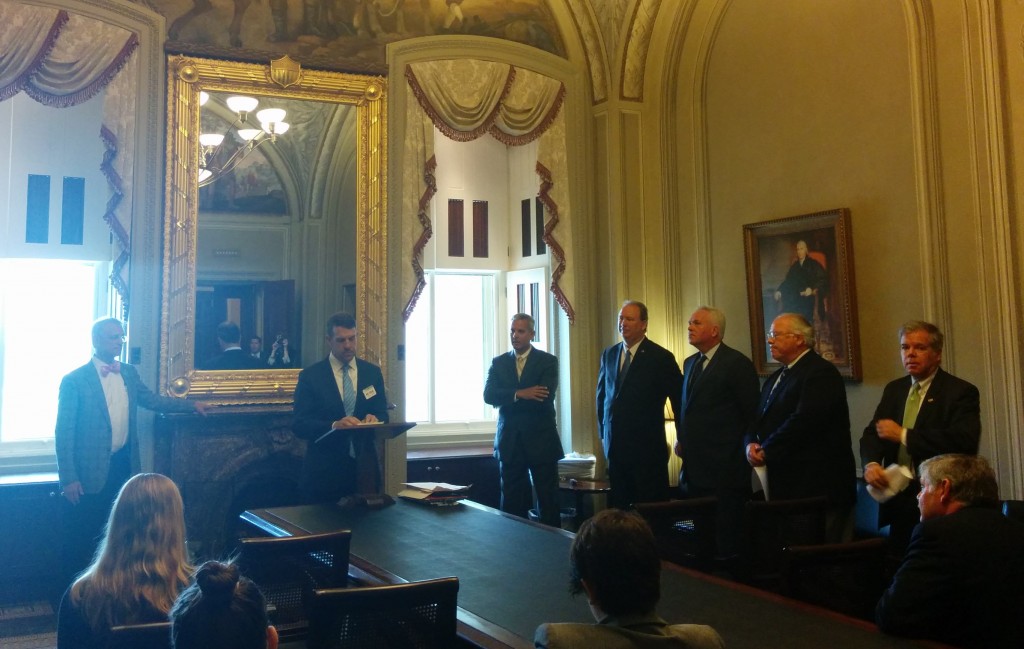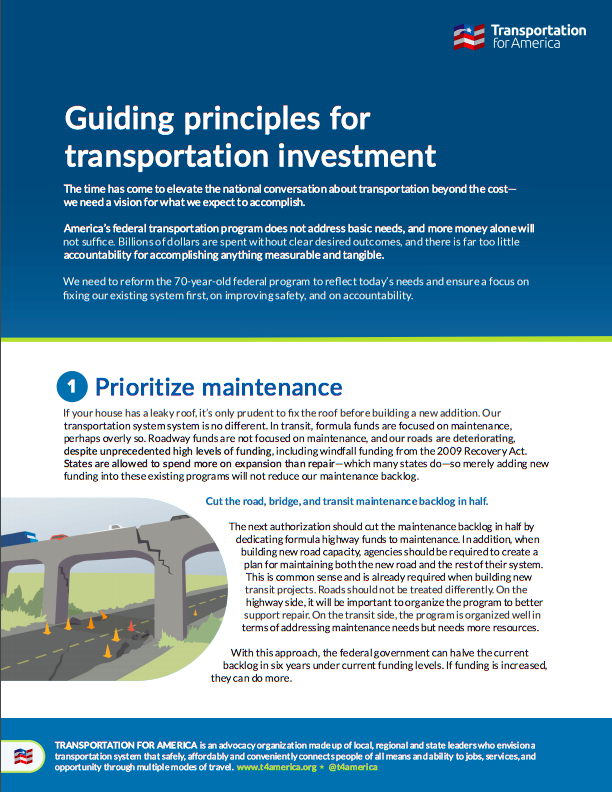House takes first step in process to keep the nation’s transportation fund solvent
For the first time since 2012, the House of Representatives held a hearing focused on funding the nation’s transportation system. Today’s hearing focused on the elephant in the room: how to adequately fund a transportation bill that’s longer than just a few months. While it’s a relief to see the funding issue finally getting airtime in the House, keeping the nation’s transportation fund solvent is only half of the problem — we also need to update the broken federal program that isn’t meeting our country’s needs.
Rep. Paul Ryan (R-WI), chairman of the House Ways and Means Committee tasked with finding the money to pay for a transportation bill, took the most obvious funding solution off the table — raising the federal gasoline excise tax — right at the start of the hearing as the gallery was still getting comfortable in their seats, deflating some members of the committee who were eager to at least discuss this option.
“We are not raising gas taxes‚ plain and simple,” he said, while adding later that the House “does need to find a real solution, a permanent solution. We are all ears.” Chairman Ryan suggested that repatriation of overseas profits (a one-time, non-transportation user fee fix) or giving states more authority could be possible solutions, but a gas tax increase is off the table.
Before the hearing, Rep. Earl Blumenauer (D-OR) held a press conference featuring a coalition of groups who support his bill to raise new revenue in the House by phasing in a 15-cent increase in the gas tax. Civil engineers, general contractors, roadbuilders, public transportation operators and T4America director James Corless spoke at the press conference to support Rep. Blumenauer’s case that Congress’ inaction is negatively impacting our nation’s economy and action is long overdue.

T4America director James Corless speaking at this morning’s press conference
Rep. Blumenauer carried his momentum from the morning press conference into the hearing an hour later.
“We’re not keeping up our end of the bargain for the 50 percent of capital spending on big projects that comes from the federal government. We haven’t made any meaningful adjustment since 1993 to the gas tax, relying on short-term fixes, gimmicks – and no matter how you slice it, adding to the deficit,” Rep. Blumenauer said in his prepared remarks.
Rep. Lloyd Doggett (R-TX) concurred. “What is missing from our transportation policy is money – revenue. We cannot build these highways with fairy dust,” Rep. Doggett (R-TX) said.
Rep. Renacci (R-OH), who has put forward a separate plan to index the gas tax to inflation and set up a mechanism to provide long-term transportation funding, noted that “short-term fixes cost money in delay and uncertainty.” He shared a story about meeting with constituents, including some tea party members, on transportation issues. He said that they told him, “‘Quit going to the general fund and taking dollars…what you’re doing is passing it onto our children and grandchildren. What I’d be willing to do is pay a user fee as long as I get my roads and bridges fixed.’ We have to come up with a long-term solution, we can’t continue to go down this path,” he said.
As Rep. Bob Dold (R-IL) from the Chicago area noted on the topic of buying new railcars for the CTA and Metra, “Do we buy them one at a time or ten at a time? I can get a far better deal if I buy them ten at a time,” he said. When agencies can’t reliably put together a multi-year budget because they have no idea what to expect from the federal government, projects can begin to cost more than they should.
Following on the heels of today’s Ways & Means hearing, the Senate Finance Committee is holding a hearing of its own tomorrow on transportation funding.
We can hope that the newfound willingness to discuss the challenging revenue question will lead members of Congress to build consensus around a funding proposal suitable for the nation’s need. However, simply raising new funding to pour into a broken system isn’t going to get us where we need to go either — we need to fix the broken system and update it with the kinds of policies that ensure every dollar invested by taxpayers provides the greatest benefits for the economy and our communities. It’s not enough to simply raise money and spend it on the same processes that created the crisis we find ourselves in today. America can do better, and it’s important that the decisionmakers understand this fact.
On that policy question, eyes are quickly turning to the Senate Environment and Public Works (EPW) Committee, which is responsible for the highway title — the largest portion of the bill. They are planning to release and mark up their successor to MAP-21, a six-year bill, next Wednesday, June 24th.
We are counting on the Senate EPW Committee to release a bill that can maintain our current system, complete the transportation network, incentivize the strategic investments that can provide access to opportunity for all Americans and best improve connections within the cities and towns that drive our economy.
Continuing and improving a nascent process to measure the performance of our transportation investments would allow us to better ensure that our limited resources bring the best return. And a forward-looking plan to direct more of that money down to where it’s needed most would be a great companion to any plan to shore up the nation’s transportation funding.
We’re now looking to the Senate to make progress on finding a long-term funding solution, but also to make the policy changes we so urgently need to ensure those dollars are well spent.






Pingback: Today’s Headlines | Streetsblog St. Louis